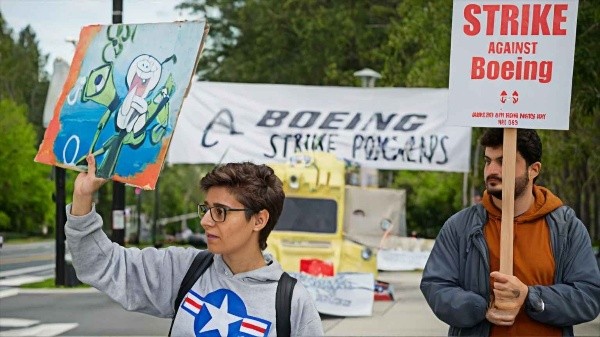Job Cuts and Financial Struggles
Boeing, the renowned American aerospace manufacturer, has announced a significant reduction in its workforce, planning to lay off approximately 17,000 employees, which constitutes about 10% of its total staff. This decision comes as the company grapples with mounting financial losses and the impact of a recent strike that has disrupted the production of its most popular aircraft models. The announcement was made by Kelly Ortberg, Boeing's new president and CEO, in a memo to employees on Friday.
Ortberg, who took over the leadership role just two months ago, acknowledged the difficult position the company is in, stating, “Our business is in a difficult position, and it is hard to overstate the challenges we face together.” This sentiment reflects the broader struggles Boeing has faced in recent years, including production delays and safety concerns that have tarnished its reputation.
Impact of the Strike
The decision to cut jobs is partly influenced by a strike involving 33,000 hourly workers that began shortly after Ortberg assumed his role. This strike has severely affected Boeing's production capabilities, particularly for its best-selling aircraft. The company has indicated that the layoffs will affect not only ordinary employees but also executives and managers, highlighting the widespread nature of the challenges it faces.
In an effort to realign its workforce with its financial realities, Ortberg emphasized the need for structural changes within the company. He stated, “We reset our workforce levels to align with our financial reality and to a more focused set of priorities.” This restructuring is seen as essential for Boeing to remain competitive and fulfill customer orders in the long term.
Delays in Aircraft Development
In addition to the job cuts, Boeing has announced delays in its aircraft development programs. The launch of the 777X airplane, which was highly anticipated, has been postponed until 2026. Furthermore, the production of the commercial 767 freighters will be halted in 2027 after fulfilling existing orders. These delays reflect the ongoing difficulties Boeing is experiencing in meeting production targets and managing its supply chain effectively.
Labor Relations and Legal Actions
The situation has also escalated into legal disputes, with Boeing filing an unfair labor practice charge against the union representing its striking workers. The company claims that the International Association of Machinists and Aerospace Workers has not engaged in good faith negotiations during the strike, alleging that the union has disseminated misinformation regarding the status of negotiations. Boeing has since withdrawn a previous contract offer, stating that further discussions “do not make sense at this point.”
The union, on the other hand, has accused Boeing of failing to address critical issues such as wages, retirement plans, and employee benefits, which has fueled discontent among workers.
Financial Outlook
Boeing's financial outlook remains bleak, with the company projecting an operating cash outflow of $1.3 billion for the third quarter. Additionally, it anticipates reporting a loss of $9.97 per share. These figures underscore the severity of the company's financial challenges and the urgent need for effective management strategies to navigate this crisis.
In summary, Boeing's decision to cut jobs and delay aircraft development reflects a broader struggle within the company as it seeks to address financial losses and operational disruptions. The ongoing strike and labor disputes further complicate the situation, leaving the future of the aerospace giant uncertain as it attempts to regain its footing in a competitive industry.








